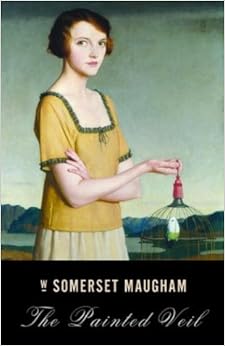Anyway.
The Painted Veil follows Kitty Fane, a young English socialite who marries unwisely for selfish reasons, moves to Hong Kong with her husband, proceeds to have an affair with a rather odious man, and is found out (this all happens very early in the book; no spoilers).
Kitty's husband, Walter, is rather a tortured soul and wishes death on both himself and his wife, which he decides to accomplish by “heroically” dragging Kitty into the epicenter of a cholera outbreak (he is an MD specializing in bacteriology). There he proceeds to fight cholera and be tortured by his soul, while Kitty proceeds to have some very interesting spiritual and emotional growth.
I've read a few books about adultery; Madame Bovary and Anna Karenina spring to mind. I thought the handling of it here was much more interesting than either (though I'd say Anna Karenina is the greater novel overall).
Neither Emma nor Anna really learns much from their affairs. Their experiences just pull them deeper and deeper into all sorts of misery. Both of them end (SARCASTIC SPOILER ALERT FOR HUNDRED YEAR OLD BOOKS!) by dramatically killing themselves. Because DEATH is the price of a woman's transgressive sexuality!
Not for Kitty Fane, bless her heart and the heart of Somerset Maugham.
Side note: I don't know how accepted this theory is, but according to Wikipedia (I know, I know) there's some thought that Maugham was more sympathetic to women's sexuality because he was himself gay. I am not entirely sure how that follows; I think the thought is because he himself had a marginalized, 'transgressive' sexuality, he was much more empathetic towards other marginalized sexualities. Again, I have no clue what the mainstream academic thought is about this theory, but it's interesting.
Kitty ends up with a really fantastic character development arc, one of the best I've read in a long time.
She realizes that her lover was a selfish, worthless sort of man. She realizes that what they had wasn't nearly so noble and romantic as she thought it was. Then she realizes that making a mistake like that needn't define her (!) and that she should be able to move on like a reasonable person (!!). She is honest with herself that, despite regretting the affair, she still doesn't love her husband, and that is Okay. She can be a good person regardless. While at the beginning of the novel she is indeed the stereotype of the self-absorbed socialite, she rapidly moves beyond that and grows in compassion, without buying into the Soul Destroying Self Flagellation that torments her husband. She almost hits a Smug I Am So Much Better phase, and then moves beyond that, too.
I really want to read more Maugham now, because I'd say that Kitty is one of the most interesting, well-written female characters written by a male author that I've encountered. She had the complexity and deep interior life of a character by Eliot, which is saying a lot. And in the end, she gets the chance to move beyond her mistakes. Pretty great for a 1920s British novel written by a dude.
“Freedom! That was the thought that sung in her heart so that even though the future was so dim, it was iridescent like the mist over the river where the morning sun fell upon it. Freedom! Not only freedom from a bond that irked, and a companionship which depressed her; freedom, not only from the death which had threatened, but freedom from the love that had degraded her; freedom from all spiritual ties, the freedom of a disembodied spirit, and with freedom, courage , and a valiant unconcern for whatever was to come.”

Follow @earthscorners

No comments:
Post a Comment